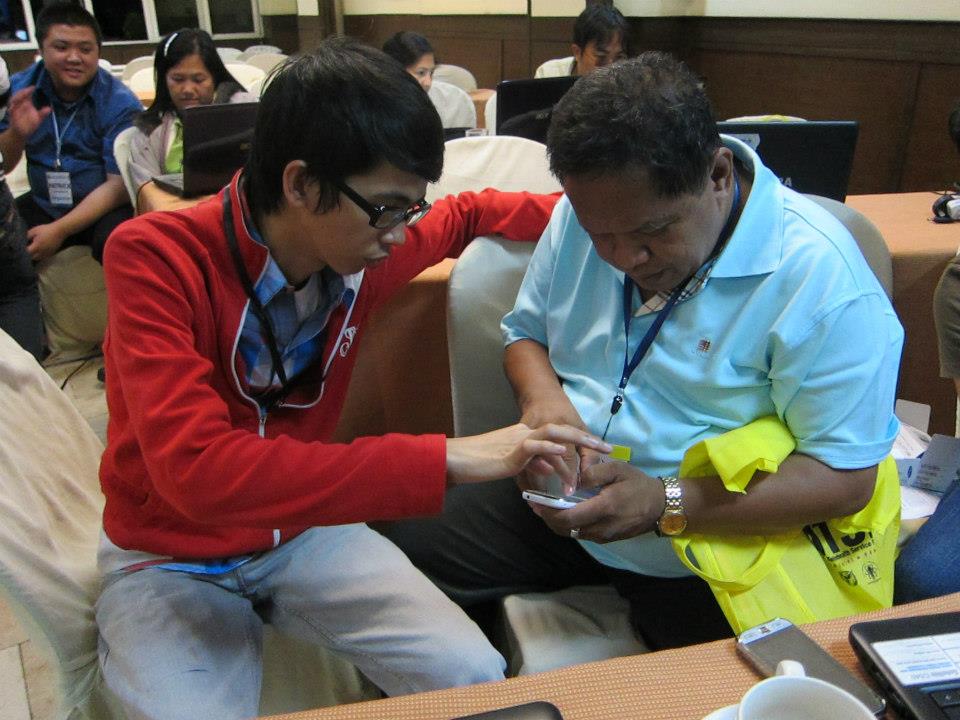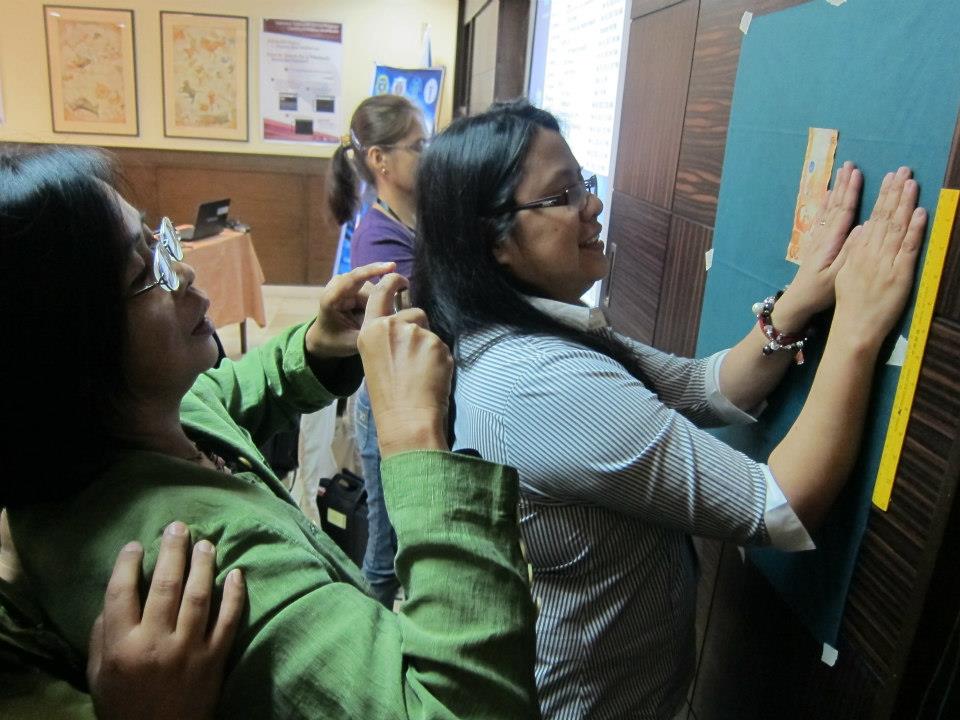Health Workers in Cordillera Trained on DOH’ Telemedicine Project
January 4, 2013 4:04 pm | by Aliyah Lou Evangelista | Posted in News

Emmanuel Pajarillaga, NTHC eHealth Nurse, teaches a doctor on how tap use a smartphone’s screen for activating controls on the phone.
Baguio City, Philippines – 78 health workers from six provinces of Cordillera Administrative Region (CAR) are trained on using mobile phones and email for delivering quality care through Department of Health’ (DOH) Telemedicine Project.
The project, formally launched as the National Telehealth Service Prorgam (NTSP), is a program of the DOH in partnership with the National Telehealth Center (NTHC), University of the Philippines Manila. It is one of the many efforts of DOH in “using ICTs (information and communications technology) for Kalusugan Pangkalahatan (Universal Health Care)”. Representatives fromDOH – National Center for Pharmaceutical Access & Management, Philippine Health Insurance Corporation, who are members of the NTSP’s Project Management Committee, and DOH-Center for Health Development-CAR, are present to observe and support the health workers as they participate in the Certificate Course on eHealth. The said course on eHealth is part of the capacity building trainings of NTSP.
Better health reform
“Let’s try it again” says Dr Portia Marcelo-Fernandez, NTHC Director as she explains factors that impede delivery of quality health care in the country. In her lecture, she said that problems in the health care system, like the lack of health care professionals in rural remote communities, impede better coverage and quality of health services in the country.
“If the DOH wanted to achieve universal health care at all, we should also aim for better, more systematic health reform” added Marcelo, “and using ICTs is part of it”.
ICT is an umbrella term for the convergence of communication platforms and technologies to access, deliver, and store information. It has various applications in the field of health, governance, and education. Since 2004, NTHC has been implementing projects in telemedicine, with various government offices including DOH, to improve access to medical specialists, especially those in remote rural communities.
The training catered to needs of health workers from all 75 municipalities in CAR. First of the two-day training is devoted to explaining the role of health workers as frontliners in the collection of health data while the second day is on equipping doctors on creating teleconsults and on teaching nurses and midwives on using smart phones for health data reporting. A continuing medical education is also held in the morning of the training’s second day.

Dr Portia Fernandez-Marcelo, NTHC Director, acts as patient in one of telemedicine’s return demo for teledermatology. DOH Telemedicine project receives image-based consults of dermatology cases.
With technology comes responsibility
“In a time when the ratio of using mobile phones exceed the population, we should definitely use these available tools to improve the health situation, ” said Dr. Patrick Sylim, NTHC Research Associate during his talk on how telemedicine in the NTSP works.
“But using technology requires a high degree of responsibility. In telemedicine, we should adhere to the same ethical principles when we were sworn in as medical personnel, ” said Dr. Ryan Bañez, NTHC eHealth Analyst in his talk on the ethical and legal consideration in the practice of telemedicine .
“A doctor may readily call a colleague and ask for an expert opinion but there are certain guidelines that have to be observed in this practice,” he said.
During the open forum, doctors asked about possible legal liabilities in telemedicine. Bañez underscored that the responsibility for patient care remains that of the doctor sending the teleconsult. Currently, there are no laws regulating the practice of telemedicine and telehealth, “but in the meantime, existing laws such as the Medical Act of 1959, apply, which defines the doctor-patient relationship, including liabilities” Bañez said.
“The use of cellphones and internet for health care is not always without harm and certainly has limits. Health workers are expected to demonstrate the same or even higher degree of professionalism and responsibility for information exchanged through these tools”, added Marcelo.
Health information for better health
Health workers discussed the limitations of manual and paper-based recording and problems quality of health. “Submitting reports to various DOH offices took time, by the moment they receive the data from our health centers / rural health unit, it is already stale and irrelevant,” Marcelo said, “authorities may not be able to respond to a disease outbreak immediately”
In a stacking game, health workers learned the importance of their role as health data collectors submitting reports to various DOH offices. “If we don’t report the right data to DOH, much resources will be wasted,” said Dr. Marcelo.
“Coordination, team work, and communication are important in forming the base of the stacks,” explained Dr. Arlene Ottao, Municipal Health Officer of Barlig, Mt. Province. Trainers correlate the base of the stacks which forms the health data structure in the country’s health care system.
“We are disheartened by the fact that there are a lot of projects initiated but very few have flourished. We hope you understand that we have a lot of work as health workers, but then, we hope that we will be able to maximize this telemedicine initiative,” said Dr Rhodora Montesa, municipal health officer of Asipulo, Ifugao. All health workers agreed that that the results of the telehealth project is something to look forward to.
Since November 2011, NTHC has been working closely with DOH in implementing NTSP nationwide. Aside from CAR, NTHC has started training health workers of Eastern Visayas (Region 8), Masbate and Tawi Tawi as part of its priority sites. Aside from specialists in Philippine General Hospital, the Eastern Visayas Regional Medical Center has come on board, and specialists began addressing teleconsults from municipalities from Region 8.